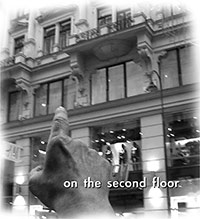4. Kärntnerstrasse 28
Kärntnerstrasse 28
I remember my maternal grandmother well. She had the apartment next to us on the second floor of our house on Rueppgasse 16 in Vienna’s second district. I loved sitting in her kitchen with the ticking wall clock. My favorite dish was her goulash. My grandfather died in the twenties. My grandmother was lucky enough to die of a broken heart when I was four, after my parents had left with me for England in 1939.
My paternal grandmother, who was thin and bony, has always been faint in my memory. She had a clothing salon on the third floor of Kärntnerstrasse 28, the elegant shopping street in the first district. My only memory is playing on the floor with a wind-up racing car with a removable driver. My grandfather died in 1935, the year of my birth. It was my cousin Peter who told me about the deportation. When the Gestapo came for my grandparents, his father, my Uncle Fritz was in the apartment. They pushed my grandmother around and struck her since elderly Jewish women didn’t warrant any other treatment. When Uncle Fritz protested, they told him that he could come along too.
Peter and my Aunt Lotte were in England at the time. Uncle Fritz had planned to follow, but he had waited in vain for a visa. His last words to Peter are contained in the following letter.
My dear, dear Peter,
When you read these lines you will no longer have a father. Don’t be too sad about that. We cannot interfere with the course of fate. I do not know how old you will be when you read these lines. Now you are nine, and I feel that I must let you know that every thought about you fills me with joy and pride. I can truly say that you are a fine son. You have a good hold on life and I fervently wish that you will continue to develop physically and spiritually in the same manner. I cannot give you much advice on your path. You are so young, too young to understand me completely today, but there is one thing I want to say. You still have your mother, a mother who is wonderful. I am sure that there is that there is none better in the world today. She is very unhappy. Try to console her! So much grief and sadness lie ahead of her. Be a good son and prepare yourself for manhood so that you can help her.
When you left Vienna, I thought that I would be able to follow you soon and that it would not be too long before I could begin a new life somewhere in the world: you, your mother and 1 together. But fate has taken a different turn. Be brave, my son! You have to be tough and hardy to cope with life. Go your way without swerving and don’t let life get the better of you! Be proud of your parents! They are disconsolate, but through no fault of their own. If you become a man your mother can be proud of, I have not lived in vain. Good luck, my son,
Your father
The offices of the right-wing Freedom Party were located in what was once the apartment of my grandparents on Kärntnerstrasse 28. Now a trend clothing store is at that address.
A “German” in London
In 1940, during the blitz in London, after’ the wailing of the sirens and the thudding of bombs, I didn’t like the silence and said, “Mommy, I want more bombs.” An English lady next to us exclaimed: “A typical German!” I was five at the time and although of Jewish stock, was indeed a German of sorts since Austria had become part of Germany.
A year later in the United States, in the safety of my foster home in Princeton, New Jersey, one night when there was thunder and lightning, I threw open the door to the cellar and ran down the stairs in panic.
 Kärntnerstrasse 28
Kärntnerstrasse 28